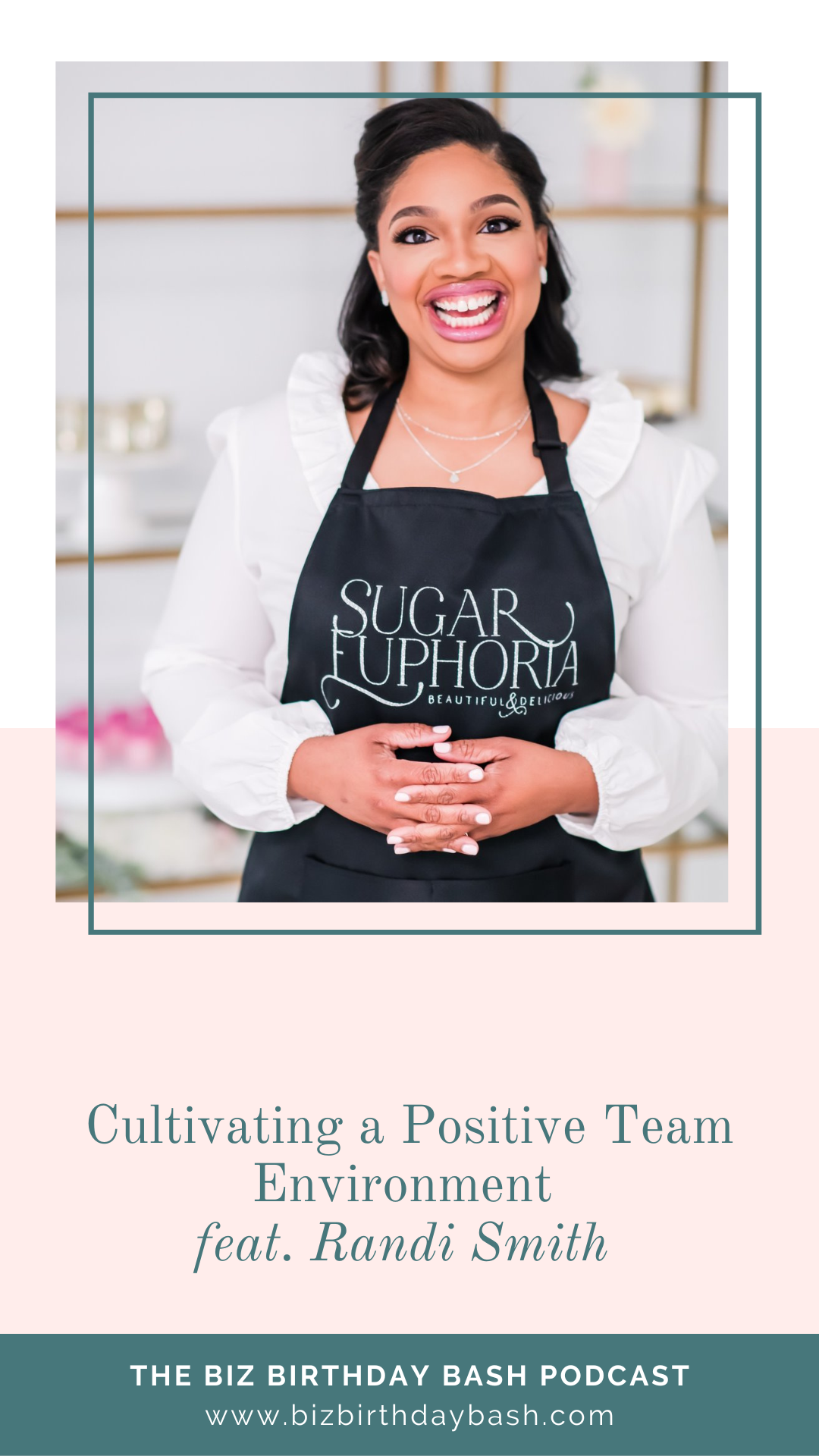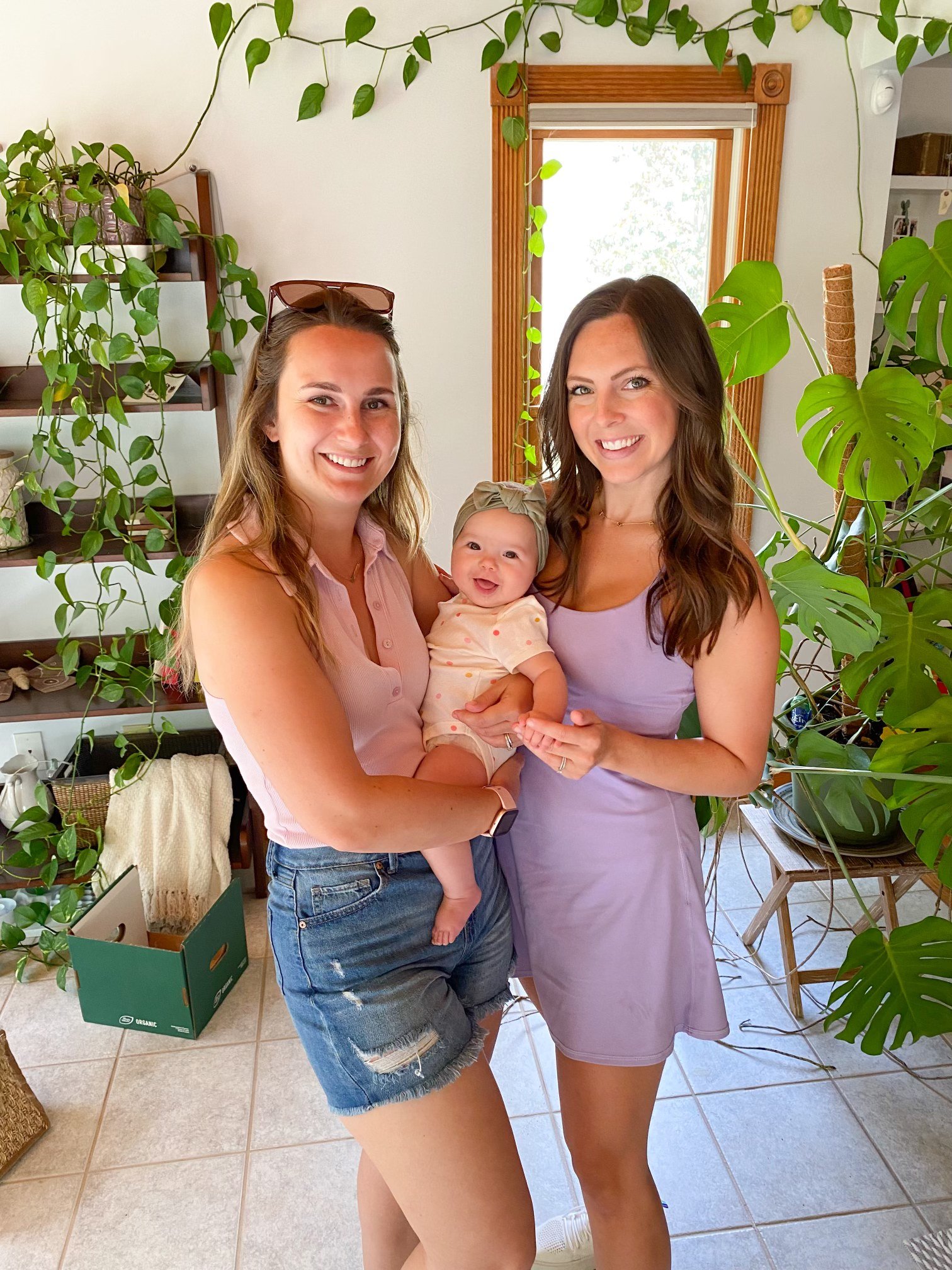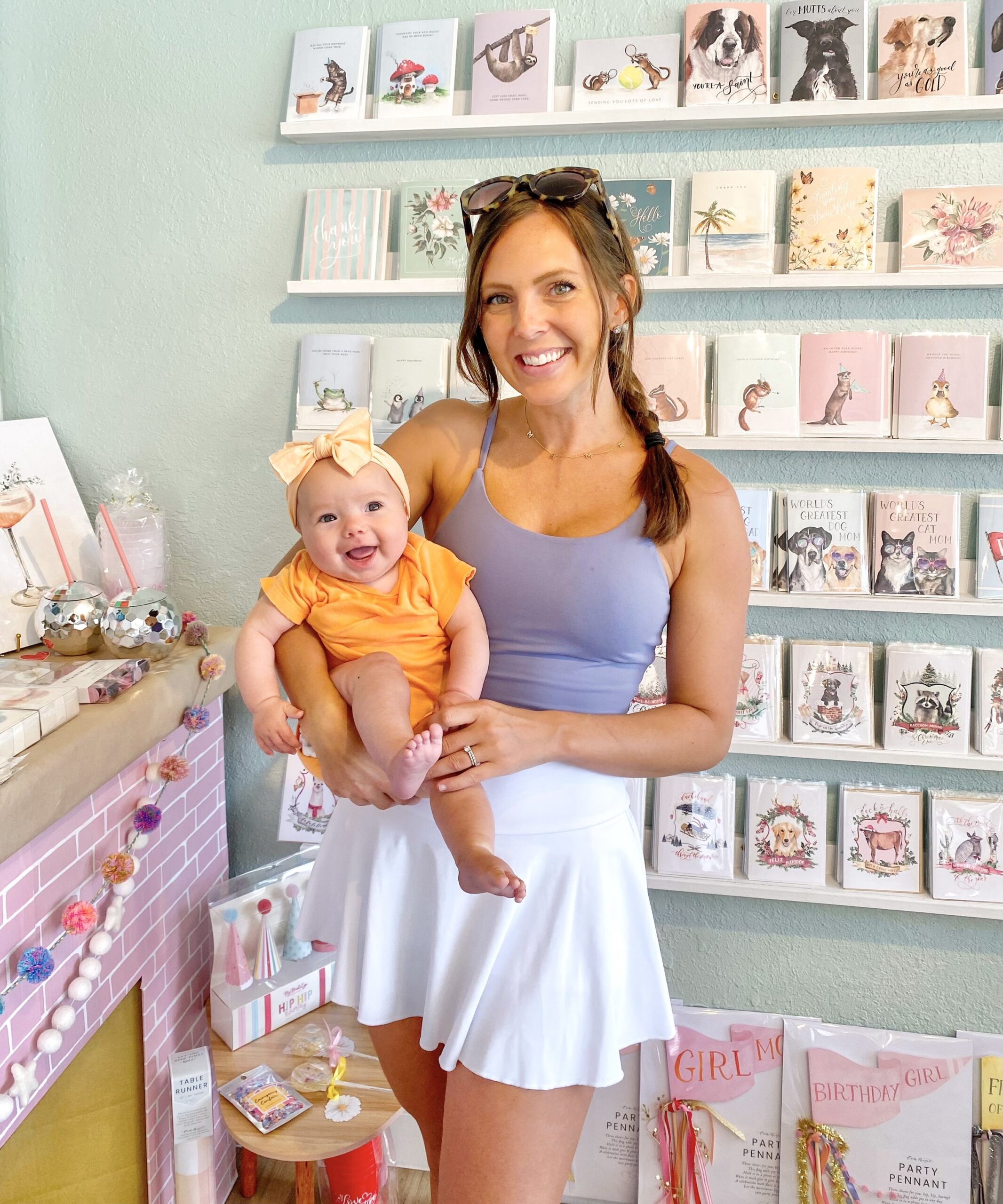Considering building a team for your creative business? Wondering how you can show up as the best leader and create a positive environment for your team once it’s established? If so, this episode is for you! Today we’re bringing Randi Smith, founder and lead designer at Sugar Euphoria on the show to chat all things related to team building and leadership. Listen in as she shares her best tips for deciding when to make your first hire and what tasks to outsource first. Plus, hear about how she’s remedied conflict in the workplace and intentionally cultivated a positive team environment along the way!
Let’s be friends! Find us on Instagram http://instagram.com/bizbirthdaybash @bizbirthdaybash. For all show notes please visit http://www.bizbirthdaybash.com/podcast
Grab your FREE Training — 4 Essentials You Need to Turn Your Biz into a Profit Party: https://bizbirthdaybash.com/free-training
Please tell us how you got started in this industry and what led you to this point!
[2:00] So I grew up in Nassau Bahamas and I spent every single Sunday baking with my mom and my grandmother. So we would do things. You know, just little cookies, bars, brownies, pound cake, things like that. Super easy stuff. And I went off to school and didn’t bake a single thing unless it was like bake, break cookies or something like that.
like, I did not get in the kitchen much during undergrad. And so it wasn’t until I was in grad school. All my friends had left chapel hill and they went to, you know, exciting cities. And I was working as an HIV researcher and I would come home after work and try to zone out. And I would zone out by watching kick.
And so I, I would sit there and I’m like, man, if these big burly guys in New Jersey can make these beautiful cakes, surely I can do the same. Right? Like I’ve been baking my whole life. How hard can it be? And it was actually a lot harder than it looked, but, um, that’s how I got started. I just dove right into it after binge watching cake boss.
How long have you been doing this as your profession?
[3:30] So I’ve been baking since 2012. So I’m coming up on the 10 year anniversary in like a week. Maybe I have to go back to thank you. I have to go back to like my incorporation documents.
I can never remember if it’s April or May of 2012, but I know the 10-year birthday is coming up, so I’m gonna do something to celebrate, but yeah, it’s been a short 10 years. I would say. I feel like. I can remember just starting out in like my first logo and first company name
When did you first realize you were going to need help?
[4:52] So it was about three years in, I would say. So I was baking from home. We had a little townhouse when we first got married, my husband and I, and I was baking from home. And I quickly outgrew that space and I found I was pregnant with our first daughter. And I was like, wow. Hmm. Growing a new baby growing this busines is not sustainable here.
And the business had really taken off at that point so I initially reached out to a cupcake shop and said, Hey, you know, can I come in super early in the morning before you get there and start baking? And they said, Surprisingly, they said, yes, you can come in at like three 3 in the morning, here’s the key you can go and bake.
And you know, I went out there by myself a few times and I was like, Ooh, this is not going to work. Like I’m getting bigger and bigger by the day. And the orders are still rolling in. And that’s when I realized that I needed somebody to help me and not so much with like the front-end marketing sales, but I really needed another set of hands in the kitchen helping me with whipping the buttercream and filling the cakes and doing that crumb coating. And then I could kind of come in and finish off the design, but it was pretty early on I realized that I could no longer do it all by myself.
What do you think is important to put in a job listing and what characteristics do you look for when hiring someone?
[6:36] So I think it’s really important to be as upfront and transparent as possible when putting out a listing, you know, I think it is definitely beneficial instead of like for a baker to just be like, Hey, looking for a cake designer.
And that’s it like, yeah. well, what does that mean? What does that mean? What does the daily task look like? So I truly believe in putting out, like, you know, maybe not in the initial call for help, but definitely, early on in the process to say, you know, your responsibilities will include helping with. The cleaning, because I think people come in there like I’m gonna decorate the cake and at five o’clock I’m out of here and I’m like, no, we have to clean, you know, something like that.
Something like maintaining the workspace. So whether that’s lifting the ingredients and being transparent about that, like, you know, our bags of flour, I try not to get the 50-pound bags, but definitely like you’ll have to lift 25-pound bags of flour and you’ll also have to lift cakes that are in excess of 50 pounds.
You know, this, we get in super early in the morning and sometimes we end well into the night, depending on the workflow and the volume, and you know, sometimes mistakes happen and we have to start all over. And I also believe in putting out the salary range. I don’t know about other folks out there, but I know when I was looking for jobs, you know, everything looks so good.
And then you get to the end and it’s like, wait, how much are you offering? right. Mm-hmm like, that’s not enough. So being transparent with the expectations with the salary, and then also the skillset that you’re looking for, because I can put out a call for a cake designer and maybe they’ve just, you know, done it a few times for friends and family.
But saying, you know, we’re looking for somebody with X amount of years of experience. Maybe they have these licenses, like safe serve or a culinary degree, and that’s not for everybody, but you know, those are just some of the examples of things to, to put in the listing. Definitely your, the person’s experience and qualifications.
How did you discern what tasks you needed the most help with?
[11:50] So I would say I’m big on outsourcing. Like I not only outsource business, but I outsource in our family life as well. So for me, what I like to do is I like to sit down with a list and just run through, like, what do I have to do every day?
What are the major tasks? What are the recurring tasks that I have to do? And what are those. One-off task that can sometimes throw everything off. Yep. You know, and after you’ve been in business a while, you can kind of identify those, but I like to just write them down and then I kind of go back and categorize them.
Like, what do I really love to do and have time to do, what do I love to do? But you know, maybe it’s not always a priority for me. What are the things that I really dislike doing? Yes. , you know, for me, it’s maybe it’s unwrapping the butter and like cutting it up because I don’t like that buttery feeling on my hand.
So I’m like, okay, so now I know that I need somebody to prep, the buttercream fill and frost, the cakes. So, yeah. I just like to identify all of those different categories and kind of prioritize them in a way. So I have all different matrices or matrixes. I don’t know what that word is, but yeah.
So I like to write it all down and then go back and regroup them and then figure out what I can pass off to people. And sometimes it’s things that I love to do, but I just don’t really have time to do.
What expectations did you set with your employees up front to help cultivate a positive team environment?
[15:30] So we have folks not just in the bakery part of the business, but we also have ladies that work on like the sales and marketing side. So you have two distinct teams under sugar euphoria. You have, you know, social media marketing. Um, some of them are contractors. Some of that work I outsource and some of them work directly with me.
And then. That’s like one culture over there. And then you have the people that are in the kitchen all the time. So for the folks that are more on the business side for us, we really live in project management software. So like in Asana, stuff like that, making sure that all the tasks are out there and that we’re communicating.
So one thing that I put out front is, you know, There’s no issue. That’s too small for you to reach out to me about, especially when we’re getting started, cuz I’d rather folks ask me questions and get in the rhythm than to try to take it on themselves. And you know, just kind of take us down a path that we don’t wanna go down and generate issues that were avoidable.
So for those folks, it’s really, you know, let’s get all of our documentation together. Let’s follow this structure. Really dig into all of the features in this software and because we, we’re not all together, so we’re not in the same space. So it’s really important that we focus on being big on communication.
So that’s the people on that side of the house. yes. And then you have the people that are actually creating the cakes. So for us, it’s always being as efficient as possible, and I let them know upfront, you know, we need to get these cakes out the door as efficiently as possible without sacrificing on the quality and the style.
Because we do charge for the labor. We do charge a labor fee. So on top of every order we determine, how long is it gonna take us to actually create this cake? And then we add an additional labor fee onto that. So it’s outside of the ingredients then, you know, the overhead it’s also, okay. We have this design aspect, but we don’t wanna take so long that we’re charging people so much money for a cake because that’ll turn.
but we also just don’t wanna do it so quickly to maximize, you know, the money that we’ve made on those labor hours that we’re giving them a sloppy cake. Yeah. So that, yeah. So the expectation is that they come in and they hit the ground running every day. You know, we sit down, we talk about the orders, what’s coming up.
How far ahead can we plan and get ready? And then it’s off to the races, but then we also, you know, foster a very. I guess more like a lighthearted. Culture over there, you know, we’re playing music, we’re talking, we’re laughing. Um, but then we’re also big on the collaboration as we go through every order that goes out the door as well.
So, you know, we have folks that bake, we have folks that fill and then when it comes to decorating, then, you know, again, like I mentioned earlier, you have people with different strong suits. So one person might be better at applying fondant. Somebody may be better at sugar flowers. And so now you. Fondant cake that eat sugar flowers.
So then they get to collaborate on that particular cake. Um, maybe somebody’s better at script, you know, they have a better script and they can write on the top of the cake after somebody’s decorated the whole thing. So it’s definitely a collaborative effort and not one person, you know, from start to finish.
What is the best way to manage conflict in a work environment? Have you had any situations that needed to be remedied?
[21:32] So I’m gonna tackle the second part of that question. So, okay. Really early on, when I went into the first bakery, um, I had an assistant, it was just the two of us working side by side. And over time, I thought we had a good relationship and I asked if I was going on maternity leave. And I said, do you wanna come in as a partner in this business?
You know, I think we work really well together and I’m definitely looking for somebody that I can trust to kind of take the lead on this while I’m on maternity leave. And she declined, which was definitely her prerogative. , but despite turning down the role, she then started acting as if she carried a lot more decision-making power than she actually did as an assistant.
Like, it would’ve been fun. If she had accepted the role as a partner, then we would’ve been able to collaborate and determine what the best steps were for us moving forward, but she said no. And then acted, you know, as a partner and almost a little bit as my boss, Oh, yeah. . So then I was like because I had to kind of take a step back as I was getting closer to my due date.
And so I kept thinking like, this doesn’t feel right anymore. This is starting to feel icky like I’m dreading coming into work and I’m the owner of this business. Just be, you know, because of the attitude and the personality clash, and kind of that authoritative role that she was taking on without being an authority or as a managing partner in the business.
So we had a few discussions about it. You know, I’d let her know how I was feeling and said, you know, it seems like you definitely wanna take on more ownership in the way this company is moving forward. And if you do, the offer is still standing, but if you are deciding to stay as an assistant, then we need to go back to the parameters that we set out when you were hired.
Yeah. And she agreed. And then the behavior just kept continuing. We kept having conversations about it, uh, even brought in a mediator. Um, and then, you know, when I saw that we weren’t moving forward, then we just had to cut ties. And so that was, it’s not fun, but I definitely thought it was necessary because I felt like the culture of the company was getting to be a little bit toxic and the other folks were kind of feeling it too.
So it was definitely yucky. So we went through, you know, we went through having those Frank honest conversations about it. That was like the first step in trying to resolve the conflict. Second, we brought in an outside party to help us hash it out. And then when that didn’t work, we just had to part ways.
[24:44] But now when conflicts arise, you know, whether that’s, you know, just a personality clash or lack of communication on somebody’s part or a mistake that’s made. Then I just find the time to talk to the person one on one. I’m not big on berating people in front of the rest of the team. It just takes me back to going to parochial school and like people get in trouble in assembly Like that’s not fun. And it does not cause a positive behavior change. So , we just schedule some sit downs to kind of figure out what was going on, you know, what the exact issue was and what we can do to fix it moving forward.
So sometimes it’s just a conversation and then sometimes I’m like up back to like the handbook. Like, what do we need to, to do here so that everybody knows if this situation arises, what’s the best course of action. What’s our protocol here.
What can you do (as a boss) to ensure that people enjoy coming to work?
[29:11] Well, there are a few things we do, but I love playing music in the mornings.
I do it with my kids. I do it with the team. So there’s always something playing in the background. When folks come in, I think it gets people pumped for the day. And usually it’s a lot of random stuff mainly like. Nineties music early two thousands. Yeah. From like every genre. So people like, I don’t know what’s coming on today.
This is very random, but it’s also very fun. Yes. Um, so that’s one thing I like to do to get people excited in the morning. And then one thing that I’ve taken from my. Corporate life is just doing like little standups with folks in the morning, like get the whole team together. And we talk about what we have going on for the day.
I talk to them about what I have going on for the day. And so I think that makes people feel like they’re a part of a larger team and it gives us some structure too. And I think people really appreciate that, that they know what’s happening with their colleagues and with their supervisor. So that they don’t feel like they’re left in the dark and they’re also invested in what we have going on and vice versa.
So I think that really makes it fun. And then we love celebrating stuff, right? Like we’re in the business of being a part of other folks’ celebrations, whether it’s weddings, birthdays, or anniversaries. So I just love to celebrate my team.
What is your role as a leader of the team?
[31:14] So right now I am mainly, I would say sales. I think I’m a little bit more forward-facing than I am in the nitty-gritty of everyday tasks. So that looks like doing the cake tastings, the consultations meeting with the couples and their planners, and then working with our marketing team to generate more sales. But I’m also okay. Yeah. And then I’m also, you know, doing the, the ordering of the supplies.
Um, so I’m still taking on some of that bakery management. So I would say I’m I’m sales lead and I’m bakery manager. okay. Yeah. And create and creative director, cuz I still do the sketching. And then like I mentioned earlier, we have our folks who are actually in the kitchen doing the, the baking and the decorating.
And then, you know, we have the people who are doing the social media management, vlogging, Pinterest, and all. That fun stuff on that side.
What are your intentions for the remainder of 2022?
[33:30] So my big goal for 2022 is to get a new spot for sugar euphoria. We are currently looking at a couple of spaces that are in excess of 4,000 square feet. So it’s gonna be a big undertaking, but we definitely need more space for consultations, classes, and a kitchen.
So that is our big goal for 2022. So everything we do is working towards that move and that outfit. So it may, you know, with construction, the way it’s going, it may be quarter one of 2023 but we’re hoping for the end of 2022.








+ show Comments
- Hide Comments
add a comment